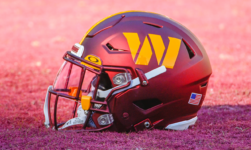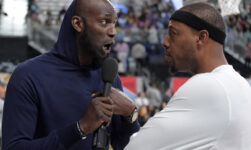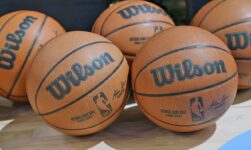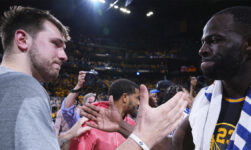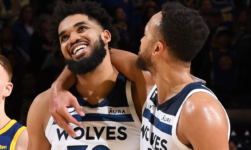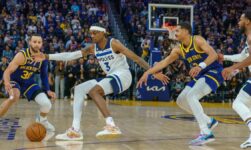NEW YORK — Minutes before Brooklyn Nets coach Steve Nash’s media availability was scheduled to start, Barclays Center was abuzz. “You saw Shams’ tweet, right?” one reporter called out to another as they walked toward the press conference room. Shams Charania’s tweet revealed that New York City had reclassified the team’s training facility as a private office building, so Kyrie Irving could remain unvaccinated against COVID-19 and practice there.
This was good news, Nash told reporters ostensibly in attendance to cover Brooklyn’s preseason game against the Milwaukee Bucks, the first one Irving would miss because he has refused to get vaccinated. Nash said he didn’t know what else to say, since it was a new development in an unprecedented situation, and the rules could change again.
Nash, along with Irving’s teammates, have been doing a ridiculous dance. They’ve long known that Irving isn’t vaccinated, and they’ve known that this makes him ineligible to play at Barclays Center (or Madison Square Garden), but they’ve steadfastly avoided criticizing him or acknowledging that he is harming the team.
The farce isn’t that difficult to pull off. You frame Irving’s absence the way you would an injury. You say you love having him around, but you have to play your best when he’s not. You say the pandemic has been challenging in lots of different ways, and this is just the latest curveball thrown your way. It’s not ideal, but it’s out of your control.
“I don’t think that anyone’s really been through this before,” Nash said at that press conference last Friday. “Obviously the pandemic has been new to everyone, but now we’re in a position where the pandemic is creating all these different new scenarios as well.”
Except it’s not the pandemic that has created this scenario. It’s not the city. It’s not the NBA. Irving creates this problem anew every day by choosing not to get vaccinated, for reasons he has declined to share, asking for privacy at Media Day and not talking to reporters during training camp in San Diego or at practice in Brooklyn. (The Athletic reported that Irving is anti-vaccine-mandate, not anti-vaccine, as if that were a meaningful distinction.)
On Tuesday, the Nets organization dropped the farce and got real. First in a press release and then on Zoom, general manager Sean Marks said that Irving will not be permitted to be a part-time player. In other words, you’re either in or you’re out, so get vaxxed or get out.
“We’re not looking for partners that are going to be half-time,” Marks said. “I don’t think that would be fair, not only on the team and staff and ownership and fans, but, to be quite frank, not fair on Kyrie, either.”
One reporter asked Marks to state for the record whether or not Irving is vaccinated, simply because the Nets had previously declined to say. “If he was vaccinated, we wouldn’t be having this discussion,” Marks said. “I think that’s probably pretty clear.”
As clear as it was, outside of that exchange, no one used the word “vaccinated” on the conference call. For two weeks, the Nets had been perfectly comfortable talking about Irving’s “personal choice,” while downplaying or dismissing the consequences that have been obvious from the beginning. It qualified as news when, on Sunday, Nash acknowledged for the first time that Irving wouldn’t be able to play at home. Gasp.
On Saturday, the Nets paraded into Brooklyn Bridge Park for their annual open practice. They played knockout, signed autographs and the rookies danced. Irving was the only one wearing a mask. Guard Patty Mills, who has been head-over-heels in love with Brooklyn since the moment he arrived, served as the Nets’ representative when it was time for a player to speak to the media. But while Mills wanted to talk about the setting, the fans and the city, all anyone wanted to hear were his thoughts on one teammate. One reporter asked Mills if Irving had any interest in getting vaccinated. Another asked if Irving had been a distraction.
“Look, I think we got to control what we can control and stay focused as much as we can,” Mills said. “But to go back to point of the day, it’s a fun environment to be [in] and leave all the distractions out and enjoy what we’ve come to do.”
Until the organization put its collective foot down, Irving had left the rest of the Nets in an uncomfortable, untenable position. If the strategy was to avoid putting any public pressure on him and hope that he would come to the right decision on his own, it failed. Marks said they still hope to “welcome him back in open arms under a different set of circumstances,” i.e. when he is vaccinated.
Marks declined to address the possibility of a trade. For now, though, he said it is best for the team to keep Irving away.
“Our hope is that we can somewhat put this to rest and move on with the season,” Marks said. “We have goals and aspirations to go and achieve out there, and I don’t think we want it to be focused entirely on an individual that is not with the team right now.”
Players might continue offering vague gestures of public support for Irving, but no longer will the organization treat his vaccine hesitancy as a quirk of The Times We’re In. It’s not as if the wind has to blow a certain direction for a needle to find its way to Irving’s arm. He just has to go get vaccinated, an amazingly easy thing to do in Brooklyn. I walked past three vaccination sites the last time I got groceries.
Marks said that he and owner Joe Tsai made the decision. He knew Irving and his camp wouldn’t like it, but, in multiple conversations, the Nets had been clear with him about where they stand.
“This is a choice that Kyrie had,” Marks said. “And he was well aware of that.”

